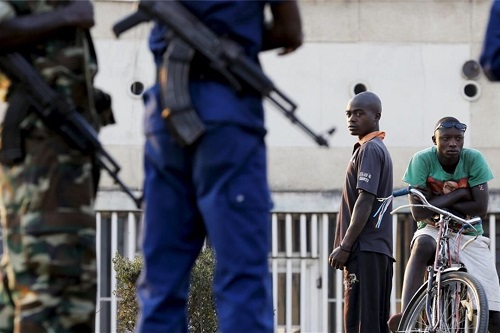Reuters photo
By
OHCHR
Serious human rights violations, including some which constitute crimes against humanity, have continued to be committed in Burundi, in 2017 and 2018. In its report, the United Nations Commission of Inquiry on Burundi describes summary executions, arbitrary arrests and detentions, acts of torture and other cruel, inhuman or degrading treatment, sexual violence and forced disappearances. The Commission is also concerned with the shrinking democratic space in Burundi as well as the growing impoverishment of the population.
“The violations that the Commission documented in its first report have persisted throughout the past year. Some practices, such as the disposal of bodies or operating at night, tend to make these violations less visible. Nevertheless, they are still real”, stated Doudou Diène, the President of the Commission of Inquiry. “The Constitutional Referendum organized in May 2018 and the campaign for the upcoming elections in 2020 have resulted in persecution, threats and intimidation towards persons suspected of opposing the Government or not sharing the ruling party’s line, whether proven or not.”
The findings of the Commission are based on approximately 900 statements of victims of human rights violations, witnesses and alleged perpetrators of such acts, including 400 statements collected this past year. This year, the Government of Burundi has once again refused any dialogue and cooperation with the Commission of Inquiry, despite repeated requests and initiatives from the Commission.
“The members of the youth league of the ruling party, the Imbonerakure, have become increasingly important in the repression, outside any legal framework and with near total impunity. The Commission was in a position to establish that the Imbonerakure acted with the approval and effective control of the Burundian State,” said Françoise Hampson, member of the Commission. “The Imbonerakure harass, control and intimidate the population. Several human rights violations can be attributed to them. They often operate alongside or collaborate with the Police and the National Intelligence Services (SNR) which remain the state organs that are the most involved in the serious human rights violations committed in Burundi.”
The strengthening of the role played by the Imbonerakure falls within a context of regimentation of the population with a view to silencing any form of opposition. “The control exercised over Burundians by the ruling power and the Imbonerakure increased significantly and is felt in all aspects of daily life”, noted Françoise Hampson. “Civil liberties, such as freedom of expression, association and movement, are today very restricted in Burundi. A significant number of independent journalists are still in exile and others joined them this year. The fate of human rights defenders is also a cause of serious concern, as indicated by the recent sentencing of Germain Rukuki to 32 years in prison, following an unfair trial.”
The political crisis that has plagued the country since April 2015 has had a negative impact on the living conditions of Burundians and on the respect of economic and social rights. “From a country in a development phase, Burundi has reverted to being a country in a situation of humanitarian emergency: the needs in terms of nutrition, water and health of a growing percentage of the population are not met”, said Lucy Asuagbor, member of the Commission. “The Government has contributed to this impoverishment by multiplying taxes and contributions which are collected willingly or by force, such as those put in place for the financing of the 2020 elections. The Government has increased the resources allocated to defence and security – and in particular, to state organs involved in serious human rights violations – at the expense of social expenditure. Corruption and embezzlement of public funds, at the highest level of the Government, has only worsened the situation.”
Human rights violations documented by the Commission of Inquiry were aided by recurring calls for hatred and violence, including by the President of the Republic. These calls took place in a general context of impunity. “The Burundian judicial system has neither the will nor the capacity to establish who is responsible and to prosecute perpetrators of violations”, stated Doudou Diène. “The judiciary has become an instrument of repression used by the executive against any form of protest or opposition. Instead of ensuring respect for the law, guaranteeing the respect of fundamental rights and determining wrongs, judicial institutions are used to cover up crimes and human rights violations committed by the Police, SNR and the Imbonerakure, by giving them impunity.”
The Commission has established a list of alleged perpetrators of crimes against humanity. This list can be made available to any organ or jurisdiction tasked with carrying out independent and credible investigations on human rights violations and abuses committed in Burundi and which will guarantee the safety of the witnesses.
The Commission calls on all the Burundian stakeholders concerned to put an immediate end to human rights violations and abuses. The Commission calls on the Government of Burundi to prosecute state agents and the Imbonerakure involved in these acts. The Commission encourages the Government of Burundi to “engage in a comprehensive reform of the judicial system, in order to guarantee its independence, impartiality and its effectiveness”, as well as reforming the security sector, responsible for numerous human rights violations.
The Commission of Inquiry on Burundi further requests that the United Nations Human Rights council extend its mandate for an additional year. “Our Commission is currently the only international mechanism investigating independently and impartially human rights violations and abuses committed in Burundi and identifying their alleged perpetrators,” stated Doudou Diène. “It is all the more crucial to continue this work as Burundi is preparing for new elections in 2020, which have already resulted in human rights violations and abuse.”
OHCHR
The Office of the United Nations High Commissioner for Human Rights (OHCHR) represents the world’s commitment to universal ideals of human dignity. We have a unique mandate from the international community to promote and protect all human rights.



No Comments Yet!
You can be first to comment this post!